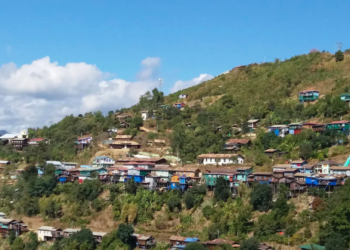RANGOON — Wednesday evening’s dramatic putsch against Shwe Mann loyalists in the ruling Union Solidarity and Development Party (USDP) appears to have been in motion since at least the beginning of the month.
At 8pm on Wednesday, two hours before security forces barricaded the USDP’s Naypyidaw headquarters, President Thein Sein announced the resignation of several ministers. At least six will contest the Nov. 8 general election for the USDP and at least eight have assumed official positions in the party’s central committee, following the ouster of party chairman Shwe Mann and general secretary Maung Maung Thein.
“It is quite likely that this was pre-planned,” said political analyst Yan Myo Thein. “We have to watch whether the party will keep Shwe Mann, Maung Maung Thein and [Shwe Mann ally] Aung Ko in the candidates list—whether they will be substituted or struck out.”
Tin Naing Thein, who resigned his ministerial position in the President’s Office yesterday, replaced Maung Maung Thein as general secretary. Immigration Minister Khin Yi and Communications Minister Myat Hein will serve on the USDP’s central committee as chair of the foreign affairs committee and head of campaigns respectively.
Railways Minister Than Htay has been named as one of six new party secretaries, along with Deputy Labor Minister Win Maw Tun, Deputy Information Minister Paik Htwe, Deputy Religious Affairs Minister Maung Maung Htay, Deputy Cooperatives Minister Than Htun and Union Civil Service Board member Kyaw Kyaw Htay, who all featured in Wednesday evening’s resignation announcement.
Myat Hein was confirmed as a USDP candidate in the upcoming general election at a party press conference in Naypyidaw yesterday. The other three senior ministers, along with Paik Htwe, were listed as USDP candidates in the party’s submission to the Union Election Commission (UEC) on Aug. 3, while Win Maw Htun’s candidacy was submitted to the commission on Aug. 1.
Yan Myo Thein said that while there were prohibitions on holding executive office and political party membership, the early August nominations were still within the law.
“It is legal for the president, vice-president and union ministers to accept party candidacy, they just can’t undertake party duties,” he told The Irrawaddy. “This is a matter for the ruling party, so we will have to wait and see.”
The Irrawaddy has been unable to confirm whether the other four resignations will be nominated as USDP candidates in the November election. The UEC’s deadline for candidate submissions is on Friday.
Other Resignations
In the same resignation announcement, published by state-run newspapers on Thursday, Thein Sein revealed that Minister of Defense Wai Lwin and Border Affairs Minister Thet Naing Win would return to their previous commissions in the military. Their deputy ministers, Gen. Kyaw Nyunt and Gen. Tin Aung Chit, are also returning to active service.
Gen. Than Htut, from the office of military Commander-in-Chief Snr-Gen Min Aung Hlaing, has been assigned as Deputy Minister of Border Affairs.
Article 235(b) of the Constitution permits resignations before the expiry of a ministerial term after a written submission to the president. Aside from Than Htut, The President’s Office is yet to announce replacements for Wednesday’s ministerial resignations.
Junta Veterans
The four men behind the four senior ministerial resignations are veterans of the former military regime.
Emerging as one of the USDP’s most powerful members overnight, Tin Naing Thein—who will contest the election from Kalaw, Shan State—is a former Commerce Minister under the State Peace and Development Council (SPDC) and remains listed on the United States Treasury’s sanctions list.
Prior to his appointment as Communications Minister in 2013, Myat Hein spent a decade as commander-in-chief of the Burma Air Force. He is seeking election for the seat of Zabuthiri in Naypyidaw, which was successfully contested by Thein Sein in 2010.
Than Htay, a former Brigadier-General contesting the Irrawaddy Division seat of Myanaung, was appointed Deputy Minister of Energy in 2003 by former junta leader Than Shwe.
Khin Yi, until 2011 Burma’s longtime chief of police, is known for admitting to former UN Special Rapporteur Tomas Ojea Quintana that the junta had provided training to the Swan Arr Shin militia, which was implicated in the 2003 attack on supporters of the opposition National League for Democracy in Depayin. He will contest an Upper House seat for the USDP in Irrawaddy Division.

















